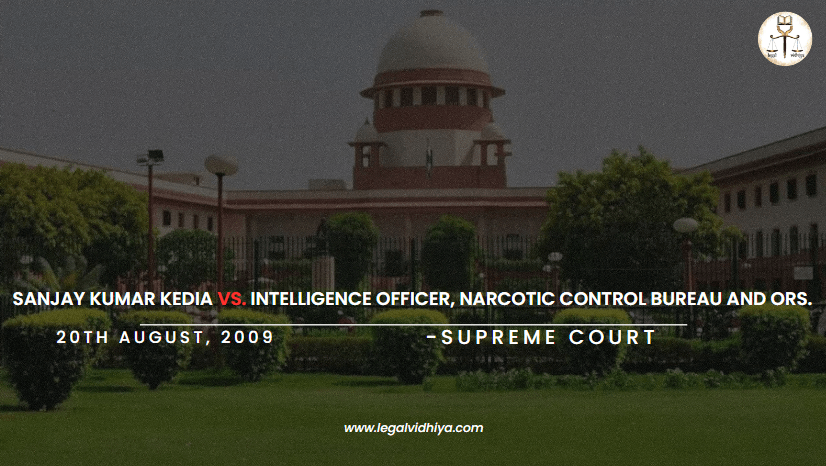
| CITATION | (2009) 17 SCC 631 |
| DATE OF JUDGMENT | 20th August, 2009 |
| COURT | The Supreme Court of India |
| APPELLANT | Sanjay Kumar Kedia |
| RESPONDENT | Intelligence Officer, Narcotic Control Bureau and Ors. |
| BENCH | H.S. Bedi and B.S. Chauhan, JJ. |
INTRODUCTION
The case of Sanjay Kumar Kedia Vs. Intelligence Officer, Narcotic Control Bureau and Ors. revolves around the extension of time for investigation under the Narcotic Drugs and Psychotropic Substances Act, 1985. The appellant challenged the extensions granted by the Special Judge, arguing that they did not comply with the legal provisions of the Act. The respondent, on the other hand, defended the extensions, stating that they were necessary considering the complexities of the case and the larger purpose behind the Act.
The case raises important legal questions regarding the interpretation and application of Section 36A(4) of the Act in the context of extending the investigation period. The arguments presented by both parties shed light on the complexities involved in balancing the requirements of the law with the practicalities of conducting thorough investigations in cases related to narcotics and psychotropic substances.
The judgment in this case is crucial in determining the validity of the extensions granted for investigation and the implications for the rights of the accused. It underscores the significance of upholding legal standards and procedural requirements in criminal investigations, particularly in cases involving serious offenses under the Narcotic Drugs and Psychotropic Substances Act.
FACTS
In the case of Sanjay Kumar Kedia Vs. Intelligence Officer, Narcotic Control Bureau and Ors., the appellant, Sanjay Kumar Kedia, was arrested on 12th February 2007 for offenses under the Narcotic Drugs and Psychotropic Substances Act, 1985. He was remanded to judicial custody in Dum Dum Correctional Home. The investigation of the case was ongoing, and related cases against the associates of the appellant were being investigated by the Drug Enforcement Administration (DEA) in the USA. Electronic equipment seized in connection with the case was sent to the Central Forensic Science Laboratory for analysis, but the reports had not been received. The appellant filed applications for extension of time for investigation on 2nd August 2007 and 30th January 2008 under Section 36A(4) of the Act. The extensions were granted by the Special Judge. The appellant’s bail application was rejected by the Special Judge and the Calcutta High Court.
ISSUES RAISED
Whether the applications for extension of time for investigation filed by the Narcotic Control Bureau met the conditions specified in Section 36A(4) of the Act and whether the extensions granted by the Special Judge were in accordance with the legal provisions.
CONTENTIONS BY THE APPELLANT
Counsel argued that the applications for extension of time for investigation did not satisfy the conditions laid down in the Act and were without notice to the accused, making the orders a nullity.
The counsel contended that the extensions granted by the Special Judge were contrary to law.
CONTENTIONS BY THE RESPONDENT
counsel supported the judgment of the Special Judge and the High Court, stating that the applications for extension of time had been made in accordance with the provisions of the Act. The respondent’s counsel argued that the Special Judge had granted the extensions after considering all relevant factors and in line with the larger purpose behind the Act, which required strict enforcement.
JUDGEMENT:
The court in the case of Sanjay Kumar Kedia Vs. Intelligence Officer, Narcotic Control Bureau and Ors. held that the extensions granted to the investigating department under Section 36A(4) did not satisfy the conditions laid down in the Act. The court found that the extensions were contrary to law and, therefore, must be struck down accordingly. Additionally, the court addressed the rejection of the appellant’s bail application, noting that the Supreme Court had rejected the bail plea on 4th February 2008, and the complaint had been filed before the extended date had expired. Considering the seriousness of the allegations, the court ruled that the appellant was not entitled to bail.
Furthermore, the court criticized the High Court for deviating from the observations in a previous case and for not following the directions given by the Supreme Court. The court emphasized that the applications for extension of time did not meet the requirements of the Act, and the extensions were not valid. The court’s judgment highlighted the importance of adhering to legal provisions and precedents in such cases.
CONCLUSION
In conclusion, the case of Sanjay Kumar Kedia Vs. Intelligence Officer, Narcotic Control Bureau and Ors. centered around the extension of time for investigation under the Narcotic Drugs and Psychotropic Substances Act, 1985. The court found that the extensions granted by the Special Judge did not meet the legal requirements specified in the Act and were, therefore, deemed contrary to law. Additionally, the court ruled that the rejection of the appellant’s bail application was justified based on the circumstances of the case and the seriousness of the allegations.
The judgment emphasized the importance of adhering to legal provisions and precedents in matters concerning the extension of time for investigation in criminal cases. The case highlighted the significance of following due process and ensuring that all legal requirements are met when seeking extensions for investigation periods under the relevant laws.
REFERENCE
- Manupatra
- https://indiankanoon.org
This Article is written by Akanksha Mishra student of CPJ CHS & SoL, GGSIPU; Intern at Legal Vidhiya.
Disclaimer: The materials provided herein are intended solely for informational purposes. Accessing or using the site or the materials does not establish an attorney-client relationship. The information presented on this site is not to be construed as legal or professional advice, and it should not be relied upon for such purposes or used as a substitute for advice from a licensed attorney in your state. Additionally, the viewpoint presented by the author is of a personal nature.




0 Comments